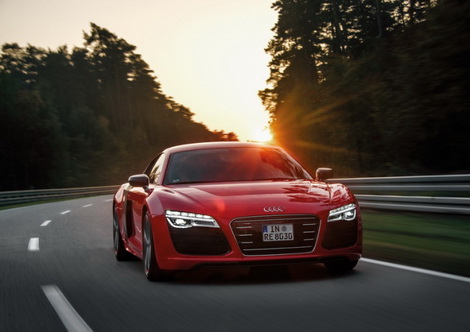Following on from the unveiling of the new, second-generation R8, Audi has confirmed that it will put an electrically-powered version of the two-seater supercar into production. Previously Audi had produced a limited-run of electric R8 models to run as a trial, however the additional weight and lack of sufficient driving range prompted Audi to refrain from placing the cars on sale to the public.
Now, advances in high-voltage lithium-ion batteries, which Audi produces in-house, as well as the versatility of the new R8's chassis design means that an electric model is now a viable option. Later this year Audi will offer the R8 e-tron for sale, but only upon customer request, with each car being specifically hand-built to order. Aside from its e-tron badging, the car will be identifiable by its unique aerodynamically optimised alloy wheels and changes to car's outer shell in order to lower its drag coefficient to just 0.28.
The lithium-ion battery is constructed in a large T-shape and is located in the centre tunnel - normally occupied by the car's mechanical transmission - and behind the passenger cell, helping to retain a low centre of gravity. Audi claims that although the overall battery package has not physically changed in size, its capacity has almost doubled from 49kWH to 92kWh. This gives the R8 e-tron a pure electric driving range of 450 kilometres, more than double the first generation's 215 kilometres.
Power output is a claimed 455hp with a maximum torque of 460Nm, which is available from 0rpm, ensuring that the R8 e-tron will have a healthy degree of performance. Audi is claiming a 0 to 100km/h sprint taking just 3.9 seconds, while the top speed is an electronically-restricted 250km/h. On-road performance will also be aided by targeted torque vectoring that will shift power distribution between the rear wheels to maximise stability.
Anything else?
The R8 e-tron will also feature Audi's Combined Charging System (CCS), which allows the battery to be charged with either direct of alternating current. This means that it will be possible to charge fully the car's 92kWh lithium-ion battery in less than two hours via the appropriate charging station.




